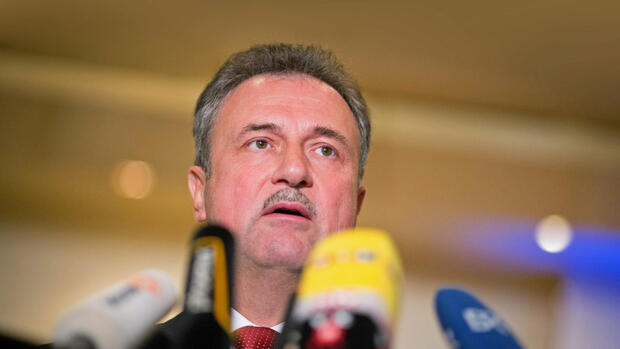The trade unionist is known for not shying away from any conflict with the management of Deutsche Bahn.
(Photo: dpa)
Frankfurt The collective bargaining dispute between Deutsche Bahn and the EVG trade union is still smoldering, and the next demand is already on the table. The train drivers’ union GDL wants to implement significant improvements for its members in the state-owned company in several areas.
The package of demands presented on Monday afternoon in Berlin provides, among other things, for a monthly wage that is 555 euros higher and an increase of 25 percent in shift allowances. At the same time, working hours are to be reduced from 38 to 35 hours per week. A tax-free inflation adjustment of 3000 euros is also required.
“We need a significant improvement in the material and immaterial working and living conditions of railway workers as soon as possible,” GDL boss Claus Weselsky is quoted as saying in a statement. Negotiations will start in November. The currently valid collective agreement runs until October – that is when strikes are not allowed. Nevertheless, passengers should be prepared for a difficult travel season in 2023 with disruptions in the timetable. There are several reasons for this.
>> Read also: ÖBB Nightjet Six reasons why Austria is so successful with its night trains
First: Despite months of negotiations, no breakthrough has yet been achieved in the collective bargaining dispute with the EVG railway workers’ union. Both sides held talks on Monday. The results of the negotiations were not initially known.
But the issues are complex. That was evident in the past week. EVG negotiator Kristian Loroch accused the company of having maneuvered the negotiations into a dead end.
Whether a compromise can be found soon remains to be seen. In any case, further strikes cannot be ruled out. The EVG has called for work stoppages twice so far, and a third strike was called off with the mediation of a judge.
Secondly: The GDL is a very strike-friendly union. The last collective bargaining dispute lasted several months, and the GDL called for labor disputes several times. Although it is much smaller than the ECG. Your collective agreement applies to around 10,000 employees, while that of the EVG applies to around 180,000 railway employees. But the GDL mainly represents train drivers. Without them, nothing works in freight or passenger transport.
Two unions are fighting over the railway workers
Third: The total volume of the claim of the GDL is difficult to calculate. But the comprehensive overall package is an indication that the union wants to achieve a better overall result than the EVG. Both unions have been competing for membership for many years. This competition is particularly evident in ongoing collective bargaining rounds. There is a risk of upward spiraling wages.
In 2021, the EVG had agreed on a crisis contract with a view to the pandemic. But after the GDL and the railways were also able to come to an agreement in September of the same year, the EVG contacted the group board with corresponding additional demands. All the same, it was quickly agreed that the EVG did not have to call for a strike.
This time the situation is even more difficult. Due to high inflation, trade unions in many sectors have already pushed through high wage increases, sometimes in the double-digit percentage range. The EVG is also demanding hefty surcharges. The railways should pay at least 650 euros more per month, and an increase of twelve percent is required for the upper wage groups.
Even this requirement for the railway management is a problem, now the package of the GDL is added. It’s a dilemma: on the one hand, the Deutsche Bahn board of directors has to be careful that wage costs don’t become unmanageable in the coming years. The state-owned company is highly indebted, with net liabilities likely to reach around 33 billion euros this year.
At the end of April, the EVG paralyzed train traffic in Germany. This could happen again in the fall due to the threat of a wage conflict with the GDL.
(Photo: dpa)
On the other hand, the state-owned company is desperately looking for staff. In the current year alone, 25,000 new hires are planned. This is only possible if the company offers attractive conditions – also financially.
Fourth: As with the last collective bargaining dispute, one of the GDL’s goals will be to expand its sphere of influence. When formulating their current demands, the union leadership mentions not only the engine drivers, but also network operations, network maintenance and vehicle maintenance.
The Collective Bargaining Act stipulates that the union with the most members in a company may negotiate the collective agreement. The other unions are obliged to adopt this. On the railways, GDL and EVG are competitors in around 70 of the 300 companies. Although a company may not inquire about membership in a trade union, it is estimated that the GDL has a majority in 18 of these around 70 companies. Only there can it determine the collective agreement according to the applicable law.
GDL boss Weselsky therefore quarrels with the collective bargaining law: He wants to conclude for all GDL members. This is only possible, however, if he also reaches the necessary number of members in the respective company. This suggests that the GDL will try to enforce their claim with all their might. This would increase its attractiveness as an employee representative.
More: Deutsche Bahn and its customers are threatened with a black year in 2023
